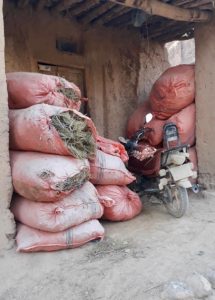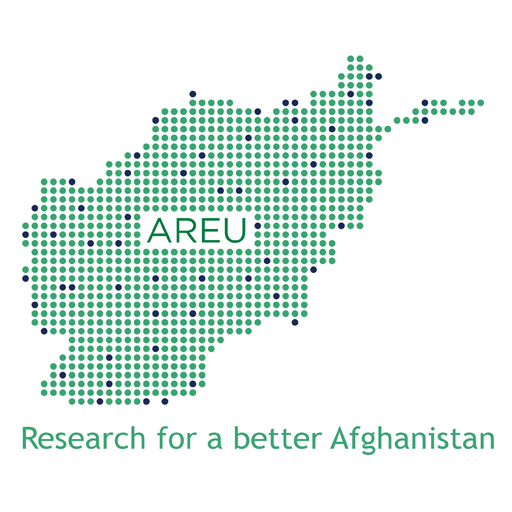
03 Mar Let us let the ink dry on the US-Taliban deal and take a good long look at history before making any proclamations about what’s next with drug production in Afghanistan.
“Blog posts do not reflect the views of AREU but those of their authors.”
The venue had not been yet agreed and the colour of ink not even chosen – let alone dried – when those with policy interests in Afghanistan and its illicit drugs production were already opining on what a settlement between the US and the Taliban would mean for opium poppy production in the country that is thought to be responsible for 90 percent of global supply. What happens, of course, will depend on whether there is a real settlement and, if so, what is its nature.
Some speculated on the prospects of a successful process and a new government in Kabul imposing a ban on drug production. After all, the Taliban had done it before when they were the government in the 1990s – or the “presumptive authorities†as those of us in the UN were compelled to call them at the time. Surely, with a peace deal bringing improved security and with the Taliban as part of any new government  there would be no reason that a ban could not be imposed? A government comprising of Taliban leadership, former Mujahideen politico-military leaders and the kind of western educated, technocrats that President Ghani (and the west) has so often favoured, would surely need to act against the illegal drugs trade if it were to be accepted as legitimate as part of the “international community†– or indeed under US legislation where action against drugs is a prerequisite for continued development assistance?

Extensive poppy cultivation (interdispersed with wheat) in the district of Khogiani in the eastern province of Nangarhar.
Another scenario was the potential for the agreement between the US and the Taliban to be little more than a prelude to what the scholar Barnett Rubin referred to as the fragmentation of Afghanistan; the possibility that the different groups within the Afghan government and within the Taliban do not reach a political compromise following US withdrawal, and chaos ensues. This is a scenario where it is speculated that the production and trade of illicit drugs will flourish, encouraged, taxed and traded by local warlords, Taliban commanders and armed groups, including, with no doubt, terrorist groups like ISIS, and  Al-Qaeda.
Yet between these two polar positions – a new unified government in Kabul with territorial control, and the fracturing of any political settlement and a return to the warring factions of the early 1990s, is the historical reality of Afghanistan. A reality where the Afghan government’s authority over the rural areas and the population is tenuous, and negotiated, and where asking a rural population to forego its wellbeing – as well as its capacity to cope with the multitude of natural and economic crisis  they are exposed to – in the name of international treaty obligations, and international concerns over drug use and transnational organised crime, is not a priority for those wishing to retain some degree of authority in Kabul.
In fact, what the successful imposition of the Taliban’s national ban on opium poppy cultivation in the 2000/01 growing season revealed was how difficult it was for the regime to exert its authority over the rural areas. In particular, it is important to remember just how protracted a process the Taliban ban was; this was not achieved overnight by proclamation. By July 2000, when an effective ban on opium poppy cultivation was at last imposed, the Taliban had issued statements prohibiting opium on no less than five separate occasions and not one of them had been heeded. It took the Taliban regime six years to consolidate its position in the rural areas, as well as fortuitously having the right economic conditions and circumstances – most notably a falling opium prices, and a protracted drought that created widespread anxiety over food security – before it could effectively impose a ban. The same can be said of the provincial prohibitions imposed by individual governors in Nangarhar in 2004/05 and 2007/08, and in Helmand in 2008/09, under the Karzai government. It was the same concerns over food security, falling opium prices and – under the state building project – the threat of US military power – that allowed the governors of both Helmand and Nangarhar to successfully ban opium production over the more limited area of their provinces.

In April 2001 farmers, with little to do in the absence of poppy cultivation, surrounded the UN mission tasked with examining the impact of the Taliban ban. They complained of mounting debts, insufficient food and showed growing resentment towards The Taliban regime and the international community. Some protested, others talked of migrating elsewhere as friends and family had already done.
Whatever political reality emerges, even under the most optimistic scenarios, it would be so much harder to impose a prohibition in Afghanistan in the coming years. Not only is the drugs economy significantly more valuable than it was in the 1990s, it has diversified and transformed, embedding into new areas and products. In southwest Afghanistan, what was just sand and tumbleweed in the 1990s, now contains more than 1.5 million people and over 350,000 hectares of new agricultural land – much of it cultivated with poppy using herbicides, pesticides and solar powered tubewells. The rainfed lands in the northwestern province of Badghis have also been settled and cultivated, so much so that a province that had no poppy in the 1990s was the second largest producer after Helmand in 2017, cultivating an estimated 35,000 hectares.

Dried ephedra bagged and waiting to be transported from the central highlands of Ghor to Bakwa for processing into methamphetamine.
There is also the move into ephedra-methamphetamine production, which has not supplanted opium production but rather created a parallel illicit economy. Found  largely in the central highlands, but also in the east and in Badakhshan - ephedra grows wild at over 2,500 metres, and its harvest and sale provide a much needed livelihood for mountainous rural households who have no history of opium poppy or cannabis cultivation. The shift from pharmaceutical based methamphetamine production to the use of ephedra in the drugs labs of the Southwest also shows the degree of innovation taking place in the drugs economy in Afghanistan and the transfer of know-how from other illicit drug producing countries and transnational organised crime.
The political conditions are also stacked against any dramatic developments in drug control. The splits in the Afghan government and among political rivals are there for everyone to see, as evidenced by the recent contested election results and subsequent attempts by Dr Abdullah Abdullah to declare a parallel administration. There are strong centrifugal forces at work in the provinces, where over the last 20 years numerous arrangements have been made between officials, Taliban commanders and local elites over the extraction of rents and income from the production and trade in a multitude of illicit economies, including minerals, people smuggling, fuel, the transit trade, and of course illicit drugs. What would be required to get these players to give up these lucrative arrangements?
There isa strong constituency for the continuation of these illicit economies and a history of protest, negotiation and even violent resistance when the state – or other actors – make efforts to restrict production and trade along particular routes or at specific locations. The interests of the economic and political networks involved in this trade, their links to provincial, national and regional powerbrokers further constrain the capacity to act against them, even were there to be a future political settlement between the government and the Taliban. The income and rent from these illicit economies are likely to be a major source of conflict in the future.
Indeed, absent a common enemy – the international military forces- factionalism and rent seeking may well befall the Taliban. It is clear that the movement is much more fractious than it was in the 1990s when under the leadership of Mullah Omar. Rivalries dominate the leadership, and at the local level, there is a vast array of different policies and practices that suggests there is a high degree of decentralisation and local autonomy. It is hard to believe that many of the local commanders who have been, with a variety of motives, fighting on the front lines would be willing to abandon opium poppy and the financial independence they have gained through its taxation at the behest of a Taliban leadership in Quetta, Peshawar, or anywhere else.

After the poppy fields are cleared the stalks and capsules are carried to the household compound where they are used to make cooking oil and for household fuel.
Moreover, were local commanders to attempt to force a ban they would find themselves facing the ire of local farmers. For the last decade or more, the Taliban has sought to exploit the counternarcotics policies of the Afghan government and western donors, and the perception that crop destruction was at the forefront of their efforts. They have done so in order to gain the support of farmers by encouraging cultivation with offers to protect the crop. In doing so, the Taliban looked to position themselves as saviours of a rural population that faced the threat of crop destruction; they sought to present themselves as a movement that understood the economic needs of their compatriots in the countryside in stark contrast to an Afghan government portrayed as “puppets†of American counternarcotics policy with no regard for the welfare of the population. It is hard to see how a Taliban leadership, and in particular local commanders and soldiers who live amongst these farming communities, would retain authority and credibility with a rural population that gave them succour during the conflict, were they to about-turn and announce a ban on opium production. Therefore, even a successful political settlement between the Kabul political elite and those in the Taliban leadership, will not yield control over the Afghan countryside – not for some time.
This is Afghanistan though, and there is of course still plenty of room for unrealistic expectations, poor judgement and a whole lot of politicking. An obvious example would be for international, or indeed, Afghan, parties, to push for the declaration of a prohibition on illicit drugs production – the kind of thing we saw in 1994 with the Taliban’s declaration that opium production was banned, and again in 2002 with the Karzai administration proclaiming drug production illegal. Neither were much more than statements on paper – despite ill informed claims that a recorded fall in opium poppy cultivation in 1995 was the result of the Taliban’s statement the previous  year, rather than a consequence of poor data collection.
A lesson I learned many years ago while working in Afghanistan was never ask someone to do something that you should already know they cannot deliver. To do so risks showing ignorance and can be interpreted as malign intent – what will be seen as an attempt to embarrass or shame someone in to showing they do not really wield the power that is claimed or assumed. Pressing for an outright ban on drugs production in Afghanistan in the near future would be seen as an article of bad faith: an attempt by one party to force the hand of the other in making a statement that would alienate the rural population, knowing full well that there is no way that any government in Kabul – no matter what its hue – could enforce it in the absence of the kind of long-term social, economic and infrastructural transformation that even the massive development monies and other resources of the last 18 years failed to deliver.

Extensive cannabis cultivation around the site of the Mother of All Bomb (MoAB) strike in Achin, Nangarhar
nstead, what is needed is a slow, deliberative and cautious path that recognises that a meaningful progress on illicit drug production in Afghanistan will take years of rural economic growth, improved governance and the slow extension of the central government’s authority into rural areas drawing on a delicate balance of coercion, persuasion and reward. This is an approach in which countering the country’s dependence on illicit drugs production is integrated into national, provincial and local development and security plans. Undoubtedly, progress will be uneven, initially limited to the more accessible areas with viable economic alternative with better resource endowments and a history of state control, before reaching into more remote and economically marginal areas, where there is a history of resistance – if not rebellion – in the face of state encroachment.
As the country takes these first fragile steps towards what we all hope will be a more peaceful future, let’s not undermine it by calling on any of the parties to make bold statements or gestures in the field of drug control which contemporary history shows will only undermine what has been achieved to date. Perhaps with the US and western military and diplomatic forces withdrawing further into the background, and with it less emphasis on short term political targets, we can at last live up to the former U.K. Ambassador in Kabul, Sir Sherard Cowper Coles, claim that a meaningful engagement in Afghanistan is a “marathon not a sprintâ€, and that significant achievements in the field of illicit drugs and transnational organised crime will be generational.

